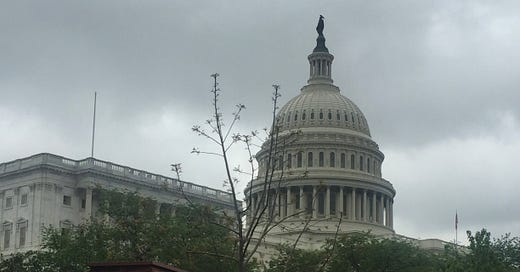Sooooo, that sucked.
The United States didn’t just elect Donald Trump on Tuesday, they elected him to the presidency for the second time quite decisively.
There are, of course, approximately one zillion post-mortems on all this: What happened? Who’s to blame? What happens now? So many other angles. My own contribution to the content mines, over at the Toronto Star, wonders what will happen when the U.S. electorate discovers that the new/old president has made a bunch of promises that he won’t be able to keep. He essentially vowed that whatever your complaint, he would fix it quickly and painlessly. (Unless you were an undocumented migrant, in which case GTFO.)
As to what happened, I don’t claim any expertise. Back on Monday, when optimism was still burbling, I noted the growing type of analysis that suggested that there was more evidence for a Harris win than the mainstream media was acknowledging. Trump had been rejected in the 2018 midterms, and again in the 2020 election, and in the years since had devolved into an old crank. In this theory, there was his devoted base, plus a chunk of die-hard Republicans who would vote for him no matter what, but a much broader swath of not-terribly-engaged voters who would vote for the candidate who was not a whiny rich asshole who demonstrably only cares about himself. It was those mostly tuned out voters, who knew enough about Trump that he was unlikeable, who would deliver the White House. The normies would save us.
In the end, it seems like the normies were decisive, but in a different way. This chart, from a Globe and Mail examination of the results, seems awfully meaningful to me:
Trump won by a significant margin in all the segments of the working class that does not make six figures a year. Basically, Americans who are relatively wealthy and comfortable voted for Harris in droves. Those who are not, who were more likely to feel the pinch of inflation, or struggle to find a suitable home, or to still be pissed off about COVID because they didn’t have a nice home with a yard that made the whole experience much less annoying, voted for the guy who was raging mad for most of the campaign and kept telling them that everything was shitty. The normies were actually pretty damn frustrated, in other words.
The thing with that explanation, the one that pins Trump’s win on anger over the lousy state of wealth distribution, which has recently ousted governments the world over and seems likely do so here in Canada soon enough, is that it gives voters a pass for supporting a candidate who was uniquely unqualified to be returned to the presidency. Trump is an awful man who ran a dark, gross campaign. Did the voters who switched from blue to red in 2024 simply not pay enough attention to realize that? Were they aware of his flaws and did not care? Did they care a bit, but not enough because it had become too hard to pay for groceries? That part is hard to know.
I do think a lot of the people who voted for Trump will come to regret it. I’m less confident that many of his supporters will do a lot of introspection, if that day comes.
Weekend reading
It’s the rare weekend edition of this newsletter, which means the weekend reading feature is properly named for once.
Over at theScore, I wrote about the Detroit Lions, who are very good. What the hell? Note that this was published last weekend, before the Lions subsequently beat the Packers to assert themselves even more. Let it be said that I didn’t curse them.
Sticking with the NFL, my latest considers the weird conundrum of NFL quarterback contracts, which is really a problem if your quarterback is not excellent. On a related note, there are not that many excellent quarterbacks:
The NFL's modern economy forces teams to confront some uncomfortable truths, the main one being that you have to pay your quarterback. If you have a starter who seems competent enough to get you to the playoffs, that's your guy. Good quarterbacks are scarce, so it's highly unlikely that a better alternative will fall into your lap. Relatedly, if your quarterback is nearing the end of his rookie deal and you aren't entirely confident that he's a game-changing superstar, you will have to pay him like one anyway.
And lastly, there have been some strange goings-on related to the local broadcast deals of a number of Major League Baseball teams. Specifically, they went kaput. Why might you care, you ask? Thanks for asking! Basically, the issues mean that those same teams might have a lot less money to spend over the winter. Which could help teams that need a lot of new players. Specifically, teams that play in the Rogers Centre that need a lot of new players. Read on!





